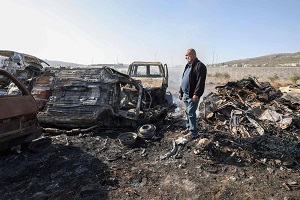Building Jordan’s future from the margins in - By Marc Rubin, The Jordan Times
Jordan joined the world in marking World Children’s Day, a moment to celebrate children, listen to them, and reflect on the promises we owe them. For Jordan, one of the first countries to endorse the Convention on the Rights of the Child, the focus remains clear: children’s rights must be realized today and every day, not only on one date in the calendar. The real measure of our joint commitment is what we choose to do in the days, weeks, and months that follow.
Every morning, children across Jordan wake up to the same rights: the right to learn, to play, to be healthy, to feel safe, and to be heard. Yet not every child wakes up with the same chances. From the busy streets of Amman to the furthest villages of Ma’an, too many children still carry burdens beyond their years. Jordan’s future will be decided at these margins; in the neighborhoods and communities where children face the greatest barriers.
The 2025 UNICEF report State of the World’s Children reveals that one in five children globally live in extreme poverty, and that child poverty remains stubbornly high even in middle-income countries. Jordan, more stable than many of its neighbors, is not immune.
Poverty in early childhood has lifelong repercussions: it hinders learning, limits opportunities, and erodes societies from within. Yet global evidence also offers a clear message of hope: investing in inclusive social protection, quality education, and basic services can sharply reduce child poverty within a generation.
When imagining Jordan’s future, the question is not whether we can afford to prioritize the most vulnerable children, it is whether we can afford not to.
Around the world, developmental efforts may focus primarily on urban areas and communities. Yet UNICEF’s experience across Jordan, from the northern cities to the southern deserts, reveals a critical truth: the children left behind are not only in greatest need; they are the catalysts to moving the country forward.
Reaching children furthest behind, including those who have dropped out of school, communities lacking access to clean water, children at risk of violence, children with disabilities in remote areas, and refugees in overcrowded classrooms, creates powerful ripple effects. When these children are supported, entire communities are stabilized, economic pressures are alleviated, and national systems are strengthened for all. This is the essence of building Jordan’s future from the edges in.
This approach has tangible results. Catch-up programs are helping out-of-school children return to class, while mobile clinics are providing lifesaving vaccines to remote communities. In Irbid, climate-resilient schools equipped with greywater recycling systems offer reliable learning environments and conserve water. And in Mafraq, a young girl re-enrolls in school after her family receives social protection support, not just a financial lifeline, but a pathway to opportunity.
The strategy extends to Jordan’s youth, who are vital to the country’s Economic Modernization Vision. Through the “learning to earning” initiative, UNICEF and its national partners have created thousands of opportunities for young people to enter the labor market, equipping them with technical skills and practical training aligned with market needs.
Our teams are traveling across the Kingdom – north, south, and center – to meet children where they are and to listen to their voices. In doing so, we are working to make World Children’s Day – and every day – a day for every child, everywhere.
That is why the launch of Jordan’s updated National Social Protection Strategy is so timely and important. It reflects a bold, nationally led commitment to empowerment, dignity, and opportunity for all, with children at the center. UNICEF is proud to support this vision, and we believe that its success will depend on how deeply it reaches the most vulnerable children and families.
Jordan has long been a regional leader in protecting children’s rights. The updated Social Protection Strategy builds on this legacy, and it is now matched with inclusive investments that prioritize children at every stage of implementation. From early childhood to adolescence, from healthcare to social care, from child labor reduction to inclusive education , these are not “extras.” They are foundations.
Global evidence supports this approach. UNICEF’s research across multiple countries shows that investing in the most disadvantaged children yields the highest return on investment , not just in lives saved, but by building long-term resilience in social and economic systems. One dollar spent reaching the hardest-to-reach can prevent more harm, create more opportunity, and deliver more sustainable impact than twice the amount spent elsewhere.
But we must act with urgency. Today, thousands of children in Jordan are still at risk of being left behind from opportunity. Rising costs, climate pressures, and decreasing international aid funding are compounding difficulties for refugees and host communities alike. As families are pushed to the edge, the cost of inaction becomes unbearable, not only in lost childhoods but in lost human capital, precisely at a time when Jordan’s Vision 2030 identifies human capital as its greatest resource.
At UNICEF, we have seen the transformative impact that inclusive, child-focused policies can have, and the extraordinary potential they hold for Jordan’s future. As I step into my role as the new UNICEF Representative, I draw on this evidence and experience with a renewed commitment to building from the edges in. Because when we make systems work for the children and young people facing the greatest barriers, we build societies able to realize their full potential. And that is how Jordan secures the prosperous future that we all aspire for.
Marc Rubin, UNICEF Representative in Jordan




